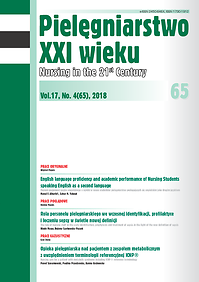Homecare of a child suffering from Leigh syndrome - a case study
DOI:
https://doi.org/10.2478/pielxxiw-2018-0031Keywords:
Leigh syndrome, homecare, nursing careAbstract
HOMECARE OF A CHILD SUFFERING FROM LEIGH SYNDROME - A CASE STUDY
Introduction. Leigh syndrome, also called subacute necrotizing encephalomyelopathy, belongs to a group of ultra-rare neurodegenerative mitochondrial diseases. It is most often caused by various genetic enzyme deficiencies. An infant with the syndrome is in need of constant care by their parents who have been appropriately trained and prepared for homecare.
Aim. The aim of the study was to present issues connected with the home care of a child with Leigh syndrome and to propose a new model of a home care based on a chosen case study.
Material and methods. The research employs the case study method. Used techniques include interviewing, observation, medical document analysis.
Results. Homecare of a child with Leigh syndrome involves stabilising and supporting life functions and ensuring safety as well as meeting both their physiological and psychological needs.
Conclusions. Present state of medicine does not allow for causative treatment. All that can be done is hindering the disease’s progress and moderating its symptoms. Complex medical care, nursing, along with rehabilitation can prolong and significantly affect the patient’s quality of life.
References
1. Piekutowska-Abramczuk D, Pronicka E, Krajewska-Walasek M. Rola genu SURF1 w patogenezie zespołu Leigha sprzężonego z deficytem aktywności oksydazy cytochromu C. Pediatria Polska 2008;83(3):212-217.
2. Tuppen HA, Hogan VE, He L. The p.M292T NDUFS2 mutation causes complex I-deficient Leigh syndrome in multiple families. Brain. 2010;133(10):2952-2963.
3. Piekutowska-Abramczuk D. The molecular background of Leigh syndrome. Neurol Neurochir. Pol. 2008;42(3):238-250.
4. Friedman SD, Shaw DW, Ishak G, et al. The use of neuroimaging in the diagnosis of mitochondrial disease. Dev Disabil Res Rev. 2010;16(2):129-135.
5. Baertling F, Rodenburg RJ, Schaper J, et al. A guide to diagnosis and treatment of Leigh syndrome. Neurol. Neurosurg Psychiatry, 2014;85(3): 257-265
6. Lake NJ, Bird MJ, Isohanni P, Paetau A. Leigh syndrome: neuropathology and pathogenesis. J Neuropathol.Exp. Neurol. 2015;74:482-492
7. Gerards M, Sallevelt SC, Smeets HJ. Leigh syndrome: Resolving the clinical and genetic heterogeneity paves the way for treatment options. Mol Genet Metab. 2016;117(3):300-312.
Downloads
Published
Issue
Section
License
Copyright (c) 2018 Authors

This work is licensed under a Creative Commons Attribution-NonCommercial-NoDerivatives 3.0 Unported License.




